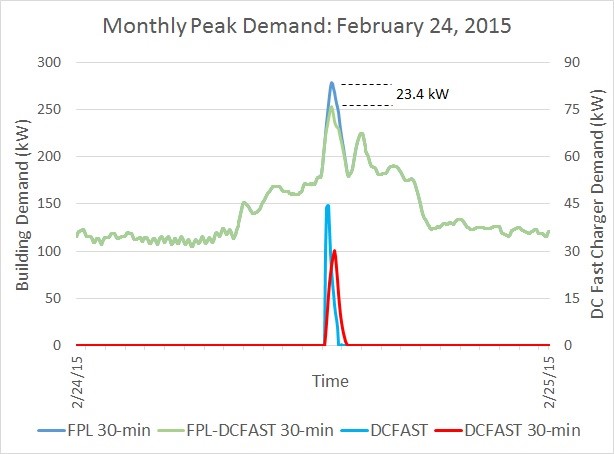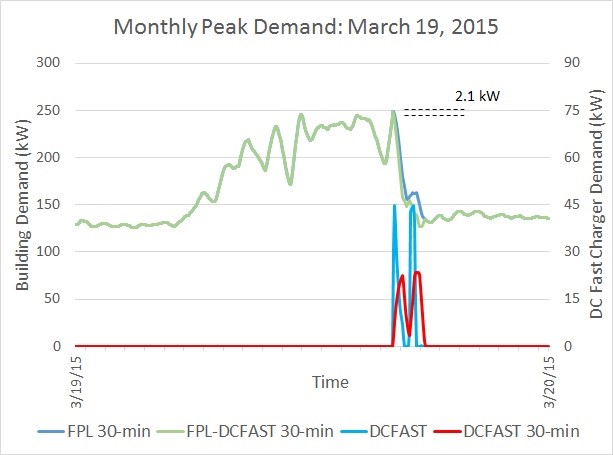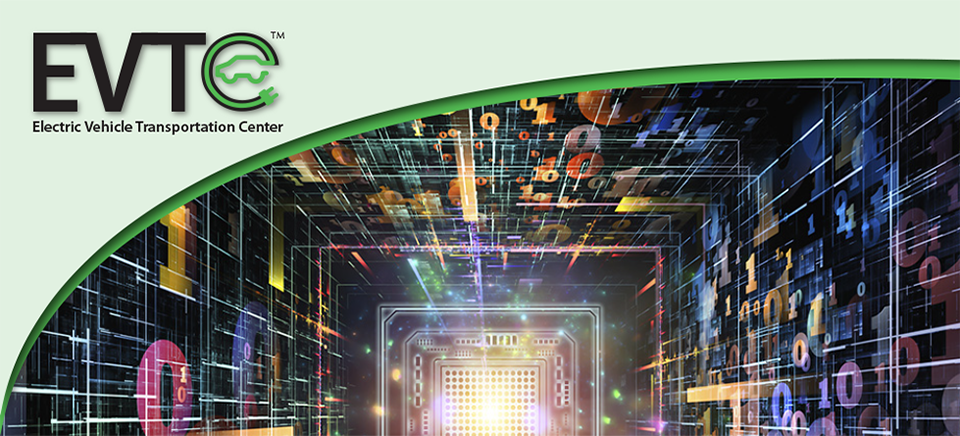Project 3:
Electric Vehicle Charging Technologies
Analysis and Standards
Objective
Assess current and emerging technologies, codes and standards associated with Electric Vehicle Service Equipment (EVSE), Electric Vehicles (EVs) and the related infrastructure. Recommend policies and best practices to advance both vehicle and EVSE deployment. Collect DC fast charger usage data to evaluate electrical power usage impact.
Brief Description
This project has evaluated the technologies and standards associated with Electric Vehicles (EVs), Electric Vehicle Service Equipment (EVSE) and the related infrastructure. Other project activities have included the purchase and installation of a DC Fast Charger (DCFC) at the Florida Solar Energy Center (FSEC) site. Collection and analysis of data from five EV chargers at the FSEC site has been completed and results from the data have shown that these high-power charging stations can significantly add to the facilities monthly electric bill because of utility demand charges. These results are presented in a report.
Research Results
The project has looked at and has reported on technologies and standards associated with Electric Vehicles (EVs), Electric Vehicle Service Equipment (EVSE) and the related infrastructure. The referenced report includes safety standards for infrastructure, highway and vehicles and the barriers and challenges of deploying an expanded network of EV charging stations. The report has also made recommendations to help standardize and expedite EVSE infrastructure and charging network deployment.
Other project activities included the installation of a DC Fast Charger (DCFC) and the collection and analysis of data from its use. EVTC staff efforts resulted in the installation of a DCFC charging station donated by Nissan and NovaCharge. The 50kW station was installed on the Florida Solar Energy Center (FSEC) site in January 2015 and is used for both research and public charging. The Signet Systems FC50K-CC charger has dual plugs and is equipped with both the CHAdeMO and SAE J1772 Combo connectors (1 EV per charging session). The charger's location at FSEC provides the first fast-charge coastal location for PEV owners traveling between Orlando and Florida's Space Coast; including visitors to the Kennedy Space Center and Cocoa Beach.
Six months of data from the DC Fast Charger has now been recorded and analyzed. Plots of the FSEC electrical monthly peak load day (February 24, 2015 and March 19, 2015 are shown below in Figures 1 and 2).

Figure 1 - FSEC facilities electrical load profile for peak load day of February 2015.

Figure 2 - FSEC facilities electrical load profile for peak load day of March 2015.
These two graphs show that the installation of the fast charger increased the monthly peak demand by 23.4 kW in February and by 2.1 kW in March. The peak demand for the two months was 278.4 kW and 285.8 kW, respectively. FSEC’s utility costs are comprised of a cost/kWh ($0.0545/kWh) and a cost for the highest kW demand/month ($10.61/kW). Typically, these two costs are about equal each month. The information also reveals that the DCFC is a low impact facility, with only one use occurring on the February day and two uses on the March day. The data has also shown no increases in monthly demand attributable to the DCFC for the months of March, April, May and June, 2015.
From the charger data, a report, referenced below, has also been produced that examines the life-cycle costs associated with the charging of electric vehicles and the impact that plug-in electric vehicle (PEV) charging may have on commercial building electricity cost. Through a life-cycle assessment of typical EVSE equipment, including first cost and maintenance and operating costs, it was found that AC Level 1 or 2 workplace charging can be similar to or lower in cost than charging at home. The cost to charge a PEV at home using an AC Level 1 charging station is $1.79 per charging session, charging at work would cost $1.53 if utility demand charges were not part of the electric bill, or $1.79 if demand charges were included. Charging the PEV at higher power levels (e.g. AC Level 2 or DC Level 2) can result in much higher costs when charging stations are used less than 3 times per day.
Future program research will evaluate processes on how to effectively manage the impact of this high voltage device on FSEC’s utility bill. This application will provide results on how to minimize “demand charges” in a commercial account environment.
Impacts/Benefits
DC Fast Charger Donation - Residents of, and visitors to, East Central Florida now have access to a DC Fast Charger, thanks to efforts of the EVTC staff and the good will of Nissan and NovaCharge. The charger provides the only fast-charge location for travel between the Orlando area and Florida's Space Coast, including visitors to the Kennedy Space Center and Cocoa Beach.
Data has been collected on building and fast charger electrical energy usage. The data shows that fast chargers can increase electrical demand loads. Methods are under research to minimize these demand loads and charges. This application will provide results on how to minimize demand charges in a commercial account environment.
Reports
Kettles, D., (2015). Electric Vehicle Charging Technology Analysis And Standards, (FSEC Report No. FSEC-CR-1996-15). Cocoa, FL: Florida Solar Energy Center.
Raustad, R., (2016). Cost Analysis of Workplace Charging for Electric Vehicles, (FSEC Report No. FSEC-CR-2030-16). Cocoa, FL: Florida Solar Energy Center.
Raustad, R., (2016). EV Workplace Charging Energy Use and Cost Case Study, (FSEC Report No. FSEC-CR-2037-16). Cocoa, FL: Florida Solar Energy Center.
Kettles, D., (2017). Electric Vehicle Charging Technologies Analysis and Standards, (FSEC Report No. FSEC-CR-2057-17). Cocoa, FL: Florida Solar Energy Center.
Project Title: University: Principal Investigator: PI Contact Information: Florida Solar Energy Center Funding Source: Total Project Cost: Agency ID or Contract Number: Start date: End date: |
